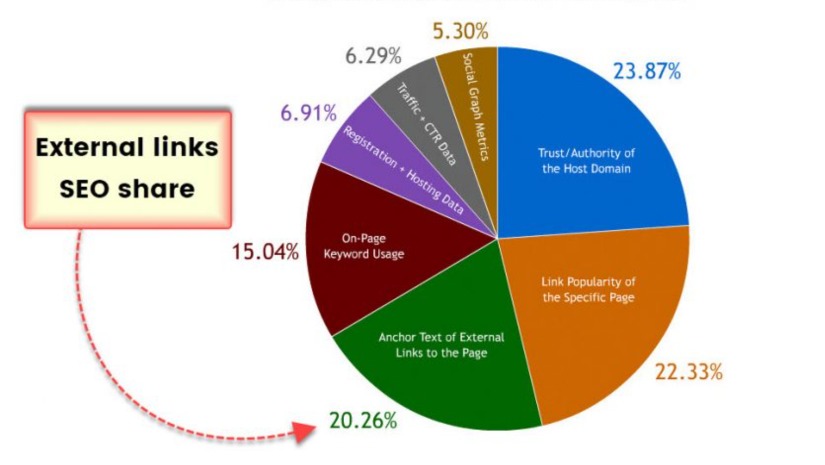
External Links: What Are They and How to Build a Strong Backlink Strategy for SEO Success
External links, also known as backlinks, are the backbone of the internet and a crucial ranking factor in Google's algorithm. In this comprehensive guide, we will explore what external links are, why they are important for SEO, and how to build a strong backlink strategy for your website. Join us on this journey to unlock the potential of external links and elevate your website's ranking and visibility on search engine results pages.
Understanding External Links:
- Definition and Types: Learn the fundamental concepts of external links, including inbound and outbound links, and the distinction between do-follow and no-follow links.
- Importance in SEO: Explore why search engines consider external links as third-party endorsements and how they influence your website's ranking.
The Role of External Links in SEO Success:
- Enhancing Visibility and Relevance: Understand how external links from niche-related websites can boost your website's relevance for specific queries and improve your ranking.
- Value to User Experience: Discover how linking to other reputable sources enriches user experience and encourages repeat visits.
- Backlinking Opportunities: Learn how external links can pave the way for natural backlinks and create a strong linking environment for your website.
Building an Effective External Linking Strategy:
- The Comprehensive Approach: Explore the elements of an external linking strategy and how it contributes to improving domain authority and reachability on SERPs.
- Leveraging Off-Page SEO: Implement best practices for off-page SEO, including backlink building, to enhance your website's credibility and authority.
Finding Relevant Links:
- The Relevance Factor: Understand the significance of linking only to authoritative websites with content relevant to your blog.
- Avoiding Pitfalls: Learn how unnecessary links to unrelated renowned websites can negatively impact your rankings.
- Utilizing Research Tools: Explore various tools available on the web to find trending topics and relevant links in your business niche.
Balancing Internal and External Links:
- Internal Linking Benefits: Acknowledge the value of internal links in facilitating user navigation and link equity distribution.
- The Power of External Links: Discover why search engines place higher value on external links as impartial endorsements of your website.
Best Practices in External Linking:
- Relevance Matters: Emphasize the importance of linking only to relevant pages to enhance search engine understanding of your website's context.
- Quality Content for Backlinks: Highlight the natural way to earn backlinks through creating valuable content that answers user queries.
- Steer Clear of Link Farms: Caution against two-way backlinking and linking to private blog networks, as these practices are discouraged by search engines.
- Optimal Outgoing Links: Guide on maintaining a balance between external links and reader-friendly content presentation.
- Descriptive Anchor Texts: Utilize variations of keywords in anchor texts for better user experience and increased website traffic.
Factors Contributing to High-Quality External Linking:

- The Credibility of Linking Domains: Understand how the reputation of the linking domain impacts the value of the external link.
- Page Popularity: Recognize how the popularity of the source page affects the link's significance in search engine evaluation.
- Relevance of Content: Learn how the relevancy between the linked source and target page contributes to the credibility of the external link.
- Natural-Language & Keyword-Rich Anchor Texts: Discover the significance of anchor texts that seamlessly blend with the content and keywords.
- The Number of Links and Root Domains: Examine how the quantity and diversity of external links impact search engine evaluations.
The Significance of External Links in SEO:
- Constant Attention: Remind readers that external links should not be overlooked, regardless of website status, as they play a crucial role in boosting website reputation and rankings.
Do External Links Matter in SEO?:
- The Impact of External Links: Reiterate the significance of external links as a crucial factor in SEO and why they should not be underestimated.
- Third-Party Validation: Emphasize how external links serve as an impartial vote of confidence from other websites, establishing your website's credibility and authority.
- Long-lasting Metrics: Highlight that external links are challenging to manipulate, making them a reliable metric for search engines to evaluate a website's reputation over time.
- Balancing the SEO Equation: Stress that external links, when combined with other SEO strategies, contribute to a holistic and effective approach to enhance website rankings.
Subscribe to Our Blog for SEO Tips and Tricks:
- Stay Updated: Encourage readers to subscribe to InfiDigit's blog for the latest SEO trends, insights, and expert tips.
- Expert Guidance: Assure readers that by subscribing, they gain access to valuable resources and guidance to excel in the ever-changing world of SEO.
Conclusion
External links are a vital component of a successful SEO strategy, playing a crucial role in enhancing a website's visibility, credibility, and rankings. Understanding the significance of relevant external links and implementing a robust backlinking strategy are essential steps to harnessing the true potential of backlinks for SEO success.
By adhering to best practices, such as linking to relevant pages, creating high-quality content, and avoiding link farms, you can ensure the effectiveness of your external linking efforts. With InfiDigit's expert insights and guidance, you can stay ahead in the digital landscape, mastering the art of external linking to dominate search engine rankings.
Stay informed with InfiDigit's blog, where you can access the latest SEO tips and tricks, ensuring that you remain at the forefront of SEO trends and advancements. Elevate your website's authority and visibility with the power of external links, and watch your online presence soar to new heights on search engine results pages.
FAQ
Q1: What are external links in SEO?
A1: External links, also known as backlinks or inbound links, are hyperlinks on one website that point to another website. These links are placed on different domains, indicating a reference or citation from one website to another. In SEO, external links play a vital role in determining a website's authority, credibility, and ranking on search engine result pages (SERPs).
Q2: Why are external links important for SEO success?
A2: External links are essential for SEO success because search engines view them as a vote of confidence and a validation of a website's content. When reputable websites link to your site, it signals to search engines that your content is valuable and trustworthy. These backlinks contribute to improving a website's domain authority, which in turn, boosts its chances of ranking higher on search engine results.
Q3: How do you build a strong backlink strategy for SEO?
A3: Building a robust backlink strategy involves several key steps:
- Create High-Quality Content: Producing valuable and shareable content is the foundation of a strong backlink strategy. Content that addresses users' needs and provides unique insights is more likely to attract natural backlinks from other websites.
- Identify Link-Worthy Opportunities: Research your industry and niche to identify websites that may find value in linking to your content. Reach out to relevant bloggers, influencers, and publications to request backlinks.
- Guest Posting: Contributing guest posts to authoritative websites within your niche can be an effective way to earn backlinks and showcase your expertise.
- Broken Link Building: Find broken links on reputable websites, then offer your content as a replacement. This approach provides value to website owners while earning you a valuable backlink.
- Participate in Online Communities: Engage in forums, discussion boards, and social media groups related to your industry. Share your knowledge and content, which can lead to natural link sharing.
- Monitor Competitor Backlinks: Keep an eye on your competitors' backlink profiles. Identifying their successful link-building strategies can inspire your own approach.
Q4: Are all external links beneficial for SEO?
A4: Not all external links are equally beneficial for SEO. The quality and relevance of external links matter significantly. Links from reputable, authoritative websites within your niche are more valuable than links from unrelated or low-quality sites. Additionally, links with a "nofollow" attribute may not pass as much link equity, affecting their impact on SEO.
Q5: How can I track the success of my backlink strategy?
A5: Use SEO tools and analytics to track the success of your backlink strategy. Monitor the number of new backlinks, domain authority, organic traffic, and keyword rankings over time. Analyzing these metrics can help you understand the effectiveness of your backlink efforts and make necessary adjustments to your strategy.
Q6: Should I buy backlinks to improve my SEO rankings?
A6: Buying backlinks is not a recommended practice. Search engines, like Google, penalize websites that engage in buying or selling links. Instead, focus on building organic backlinks through valuable content and outreach efforts. Organic backlinks are more sustainable and will contribute positively to your SEO success in the long run.







